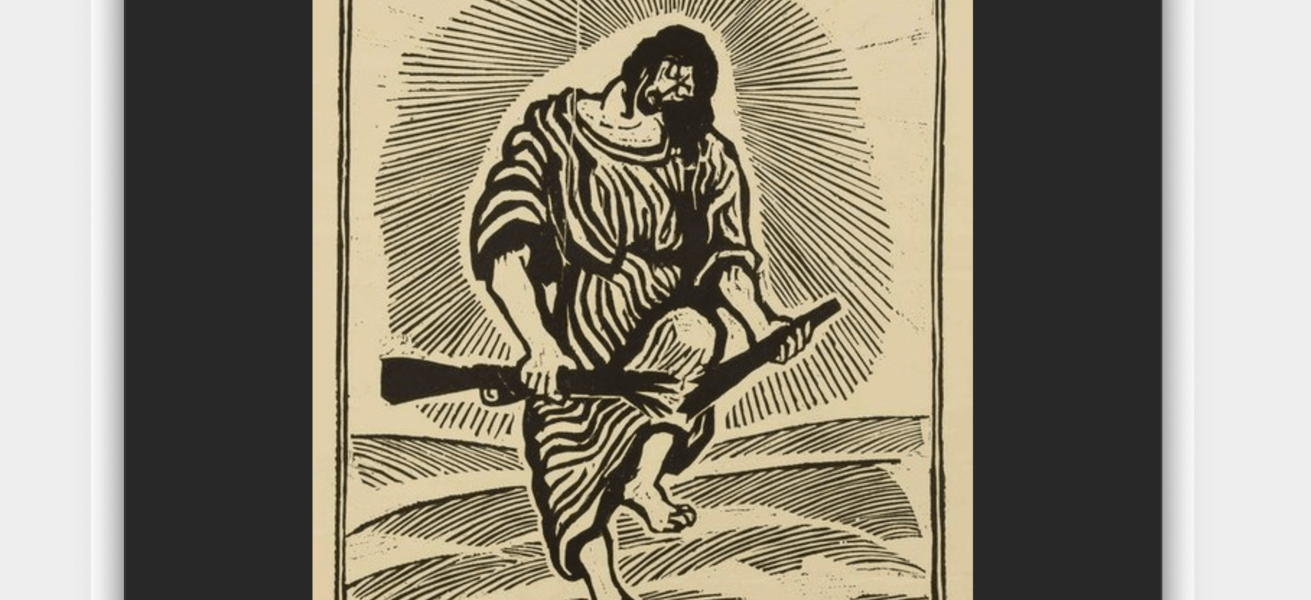The Lord is Risen Indeed!
From Kim Fabricius, Ten Propositions on the Resurrection
8. It is characteristic for the risen Christ to greet his disciples with the word shalom: “Peace be with you!” He calms their fear – of retribution, perhaps? After all, these were the men who, despite their protestations of loyalty, had abandoned their master to his fate. Perhaps now it was payback time for their betrayal? And what of Caiaphas and Pilate and all who had connived in the murder of Jesus – might we not expect a risen Terminator: “I’ll be back – and this time it’s personal”? Christian pacifists are often accused of arguing their case from the Crucified who refuses the way of violence. But the power of pacifism equally comes from the Risen One who refuses the way of vengeance. “Jesus is judge because he is victim; and that very fact means that he is a judge who will not condemn” (Rowan Williams).
So let us love, deare Love, like as we ought,
– Love is the lesson which the Lord us taught.
(Edmund Spenser, “Easter Sunday”)
Now for a separate, philosophical/theological question:
Must the resurrected body have total physical continuity with the corpse? I would suspect not--many people who died long before Christ, whose bodies have long since decomposed and whose molecules long since redistributed throughout the ecological sphere will be raised at the eschaton. However, I am not absolutely opposed to the possibility that God will recollect and reorganize our brains and/or bodies using identical matter.
If we answer "no" to the above question, was the absence of Jesus' corpse from the tomb necessary for the presence of Jesus' resurrected body? For if the matter of a fully decomposed body that died centuries ago can stay dispersed and the person raised from the dead, why couldn't the partially decomposed body in the tomb have stayed as it was and the person of Jesus raised from the dead?
Following through on this reasoning, should we say that the body was absent (merely) as a sign? That is, the disciples ought to deduce thus: "If the body is absent Jesus cannot be dead," rather than "If Jesus is alive, then the body is absent."
------
"He Himself is our Peace." (Eph 2)





1 comment:
Fabricius has some rather thought-provoking stuff, doesn't he? That's probably my favorite theology blog that I've come across so far.
As to whether the resurrection body must have continuity with the corpse, I guess that depends on your philosophy of mind. If you're a dualist, you can say that while we are meant to be embodied, the bearer of continuity is the soul; any similarities in body would be for fittingness, not out of necessity. So, in this case it would have been a sign for the disciples.
Physicalists seem to havee a bit more of a problem; it's a very real possibility that part of the plant and animal matter which I ingest was at one point the body of someone else, and so the same matter forms different people's bodies, including brains and whatnot. Also, what would prevent God from taking the matter both from me when I die, and from when I was 12 (which would presumably be completely different matter) and thereby creating 2 mes? And if there are possibly 2 mes, how does this affect my identity (would I stop being me if another me were to show up)?
I've heard of some solutions, but here are the two which seem to me to be the most plausible for Christian physicalists:
(1) God doesn't need to recapture the entire body, just one part (a "seed"). Either this part is indestructible and necessarily forms a one-to-one correspondence with persons to be resurrected, or God contingently makes sure that these seeds will all be kept safe. Then, at the resurrection God will re-form a body around these bearers of continuity, and we'll all come back. (I heard it somewhat irreverently suggested once that this was the purpose of the river of life; think of the styrofoam pellets which grow when placed in water). Peter van Inwagen has proposed this view, at least as a logically possible way in which continuity could be preserved.
(2) There is no need for continuity. We die, God recreates us, and there's no need for anything more. I believe Kevin Corcoran holds this view.
And on neither of these accounts is there a necessary connection between the entire corpse and the resurrection body. So, long answer to your question, either there is something specific about Jesus' own resurrection which requires his corpse to be his resurrection body, or it was merely because it was fitting for one reason or another (for the faith of the disciples, to prove that he wasn't dead; because if the corpse is available, it's the best option; etc.).
Post a Comment